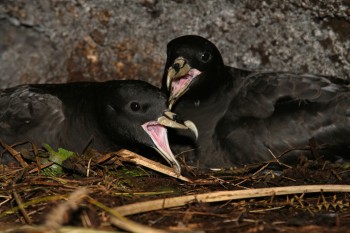Kalinka Rexer-Huber (Department of Zoology, University of Otago, Dunedin, New Zealand) and colleagues have published in the journal Polar Biology on a population survey of the ACAP-listed White-chinned Petrel Procellaria aequinoctialis on Disappointment Island in the sub-Antarctic Auckland Island group.
“The white-chinned petrel Procellaria aequinoctialis is one of the most frequently observed seabird species captured in fisheries bycatch, yet some populations remain virtually unstudied. The size of the breeding population on the sub-Antarctic Auckland Islands, New Zealand, is unknown. Disappointment Island is thought to be the main white-chinned petrel breeding site in the Auckland Islands, and maybe also in the New Zealand region, and has never had introduced mammalian predators. We estimated the white-chinned petrel breeding population size taking into account the detection probability of burrows via distance sampling and the burrow occupancy rate. Eighty line transects were distributed over the island, with a total line length of 1600 m. Burrows were patchily distributed and most abundant in dense megaherb communities. White-chinned petrel burrow densitywas 654 burrows/ha (95 % CI 528–809 burrows/ha), with burrow detection probability varying among vegetation communities from 0.28 ± 0.02 to 0.43 ± 0.02 (±SE). Mean burrow occupancy was 0.73 ± 0.03. We document an estimated total of 155,500 (125,600–192,500) breeding pairs of white-chinned petrels on Disappointment Island during mid incubation in early January 2015. The relatively high occupancy and density of burrows suggest that Disappointment Island is a key breeding site for white-chinned petrels.”

Disappointment Island, photograph by Paul Sagar

White-chinned Petrels, photograph by David Boyle
With thanks to Kalinka Rexer-Huber.
Reference:
Rexer-Huber, K., Parker, G.C., Sagar, P.M. & Thompson, D.R. 2016. White-chinned petrel population estimate, Disappointment Island (Auckland Islands). Polar Biology. doi:10.1007/s00300-016-2031-x.
John Cooper, ACAP Information Officer, 06 September 2016

 English
English  Français
Français  Español
Español